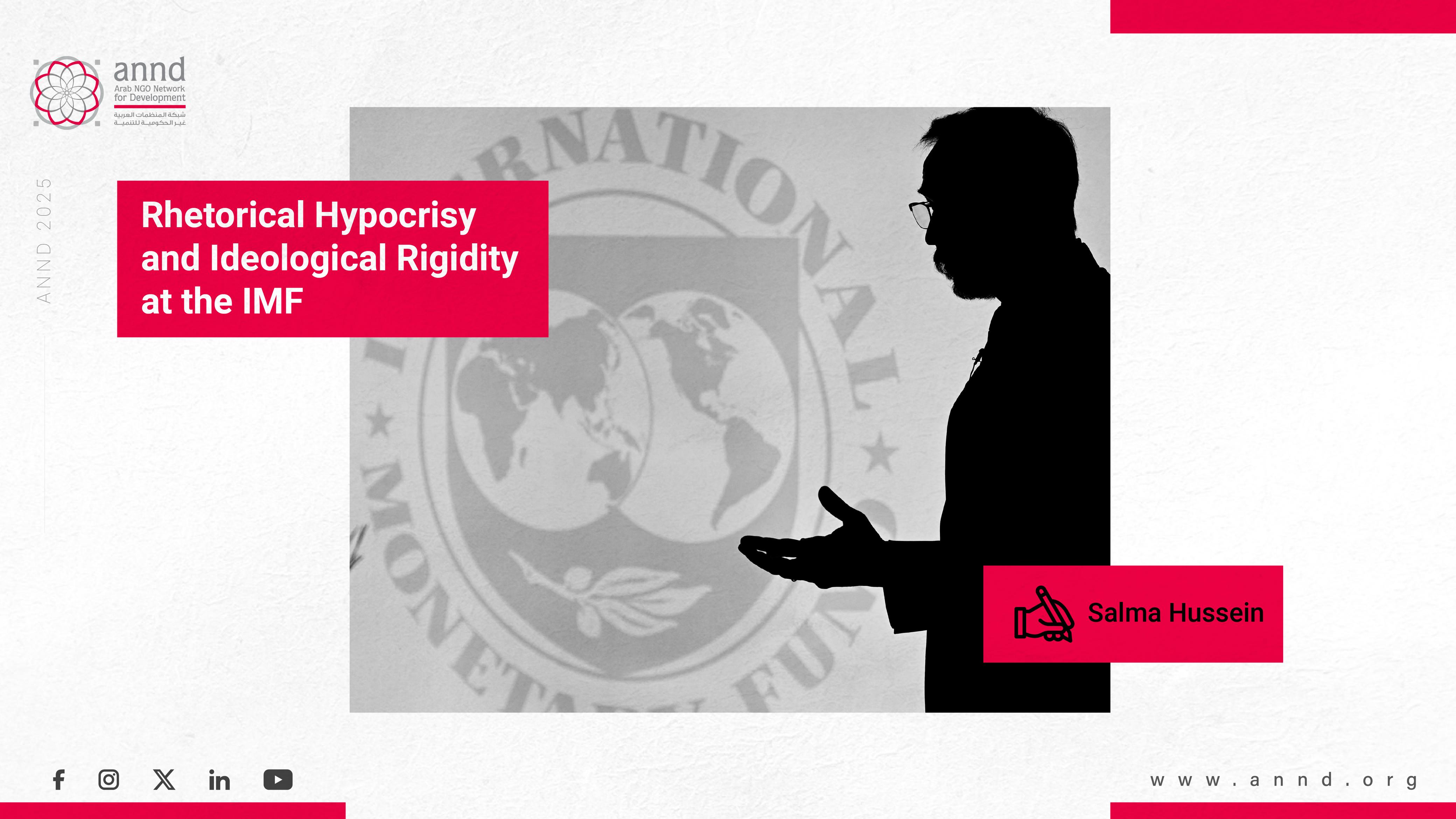
Rhetorical Hypocrisy and Ideological Rigidity at the IMF - Salma Hussein

Rhetorical Hypocrisy and Ideological Rigidity at the IMF - Salma Hussein
In Lebanon, Egypt, and around the world, popular sentiment speaks the truth. In 2012 and again in 2013, the Egyptian masses rallied in the streets, and political parties, civil society organizations, and political and cultural elites protested against an agreement with the IMF. Neither the masses nor those elites knew the details of the agreement. One might say it was a protest for the sake of protesting.
However, it later became clear that the protest was due to a sound intuition based on previous international and local experiences, through which people learned that the IMF is not up to any good. Over the past decade, despite the vast geographic scope and the varying local circumstances of each country, results were similar, without a single success story in the region.
In 2015, the state thought it had arrived at the right formula in Egypt. Then, the IMF Managing Director, Christine Lagarde, arrived. The mass movements had been suppressed, and many of their leaders had been arrested. The time seemed ripe for the IMF to lure the government, which suffered from capital flight. Lagarde began her moving speech with verses sung by Umm Kulthum. The negotiations lasted a whole year, during which the IMF and stakeholders pressured the government to borrow from various sources.
The IMF experts used all the right keywords: we have changed, the program is local, not imposed, education and health, job creation, inclusive development, public debt reduction, etc. Private and state-run media echoed them. And everyone believed them. The opposition and the oppressed masses awaited what the IMF would do in a new world.
The worrying signs of the IMF programs' results in Tunisia, Morocco, and Jordan began to emerge in 2012. However, they were not scrutinized enough, especially given the lack of coordination at the governmental level and even at the level of party and civil society work. The people and elites of each country were drowning in a flood of local political changes.
So, when Egypt was late in its agreement with the IMF, the situation of Jordan and other countries that had entered into similar agreements was not discussed. These countries belong to a new generation of IMF programs, the generation following the Arab revolutions and international social uprisings, the generation following the recognition of growing inequality around the world and its detrimental effects on sustainable growth, development, and stability. How did this IMF recognition affect the Egyptian program? It was merely wishful thinking that did not come true.
1. Political Context
In 2013, a counter-revolution erupted and was followed by a security vacuum. Capital fled the country, and Egypt fell into a foreign exchange crisis. One sign of US support for the Egyptian regime (despite public condemnation) was when the Obama administration's Secretary of State John Kerry sent a letter to the IMF Managing Director urging them to support Egypt. He also linked US aid to the country with borrowing from the IMF.
2. Transparency
No official document was published before the agreement or presented to an elected parliament. It was only discussed with the government and two pro-government MPs. In violation of its rules, the IMF also delayed announcing program details within the specified timeframe. When complying with its regulations, it omitted any criticisms or details the Egyptian government did not wish to disclose.
3. Implementation
A close reading of the IMF's first staff review documents revealed that Egypt had failed to achieve nine of the 14 program objectives, despite the government implementing the agreed-upon measures. The government implemented some measures with negative social impacts, but failed to implement most of the measures with positive social impacts. Furthermore, the government and the Central Bank failed to implement five required reforms, which are essential and beneficial to both the social and economic levels, such as those related to transparency and mitigating social impacts. Did the IMF warn against non-compliance with the program or take any action to pressure the government to implement positive measures?
In reality, the IMF welcomed the government's commitment and successful implementation. However, it did not refer directly or indirectly to any measures the government ignored or the quantitative targets that were not achieved despite its commitment to implement them. For example, the target was to reduce government spending by 0.6% of GDP. However, despite the government's commitment to reducing the government wage bill and raising subsidized energy prices, as requested by the IMF, government spending doubled, and the deficit widened (due to the conditionality of the flotation and liberalization of energy prices).
This failure to achieve quantitative targets and implement social and economic reform measures was repeated during every visit over the three years during which Egypt received its first and largest loan from the IMF.
Egypt adhered to only a handful of measures in each loan review. However, these measures are, in fact, the worst in terms of their impact on growth, unemployment, inflation, and income distribution. Meanwhile, the IMF commended the government's outstanding commitment and disbursed the due tranche of the loan.
Thus, Egypt became the IMF's second-largest client after Argentina during this period. Then, loans followed one after the other. It is now implementing—or not implementing—the conditions of the fourth loan and is requesting a fifth. Meanwhile, the structure of external borrowing has deteriorated, and its costs have increased.
Egypt only implements the real conditions—the so-called "prior actions" (i.e., those before the announcement of the loan or before receiving each tranche). However, almost no other actions are implemented, and most structural measures or quantitative targets are not achieved. When the IMF issues its reports, it either modifies those targets, accepts the government's explanation for the reasons for not reaching them, or completely ignores useful measures and targets.
Lessons Learned
Let us not be fooled by the elegant wording of the IMF documents.
In the documents issued by the IMF in Morocco, Tunisia, Jordan, Iraq, and Egypt, the preambles and stated objectives vary from country to country. They all sound friendly and reasonable; you can't help but agree with and even admire them. Here and there, they talk about education and its importance, tax fairness, and combating corruption. However, these are not what the IMF experts measure, nor do they determine the criteria for their satisfaction. They are merely the pre-emptive actions imposed by the IMF, no more, no less. These are constants that do not change from one country to another.
If the IMF must be consulted, let it be for technical advice on a sectoral matter related to governance and transparency.
The decision to borrow from the IMF is subject to the approval of the major industrialized countries that hold the largest voting bloc in the organization's Board of Directors, led by the US. However, the reality is that the IMF prefers to include a greater number of countries/clients in its fold, as this increases its profitability. Therefore, the basic principle is to entice countries, and one of the foundations of seduction is reluctance.
The more the IMF masters the game of reluctance, the more governments will follow, encouraged by vested interest groups.
The wealth of all those with dollar assets increases, as it does for those with surpluses that can lend to the government, those with energy-intensive facilities (including power plants), and, finally, the banking system. All of these people are guaranteed increased wealth by the IMF's programs. Therefore, it is best for governments not to resort to the IMF. If they must, let it be only for technical advice, such as in banking sector governance.
Borrowing from the IMF Leads to the Trap of Foreign Loans
Literature, both critical and supportive of the Bretton Woods institutions, often states that the IMF is a last resort lender. Governments must resort to the IMF when they cannot borrow from rich countries or global markets. Nonetheless, the former statement is false, as all regional experiences, most notably Egypt, have proven. In effect, the IMF is the first resort lender.
Foreign loans increase exponentially after each agreement with the IMF. It designs its programs to raise interest rates under the pretext of combating inflation. Raising interest rates is tempting for global financial capital, local banks, and the wealthy, whether to compensate savers in local currency for rising inflation or to profit from lending to the government. Therefore, when the IMF issues a "certificate of confidence" through lending to a country, it is in effect reassuring them of the high return on that loan and that it guarantees those loans by restructuring public finances, reducing all government spending except for interest on government debt and loan repayments.
Ultimately, the government finds itself forced to borrow from abroad to meet its external debt obligations, which leads to an increase in short-term, high-interest external debt, further exacerbating the country's financial fragility in the face of shocks.
Inflation is raised through a deliberate policy that benefits banks, businesses, and owning families, at the expense of the macroeconomy and fair income distribution.
The IMF induces this inflation through policies designed to
raise rates at the beginning of the program: most notably, the devaluation of
the local currency and the liberalization of energy prices for the household
sector (excluding businesses and factories, or at rates much lower than those
afforded by households). There is nothing worse than these policies on the
economic and social levels, taking flotation and its economic impact as an
example. It is a harmful measure for the economy, even by the standards of
neoclassical economics, as it represents a negative shock to aggregate demand,
which is composed of the sum of consumer demand, private sector investor
demand, government demand, and the net trade balance.
Currency devaluation doubles the import bill in a country
like Lebanon (or Egypt, Tunisia, or Jordan) that relies on imports to meet its
energy needs, food, and many inputs, worsening the net trade balance. Secondly,
the depreciation of the local currency deteriorates the country's finances,
exacerbating the budget deficit (supposedly being reduced). That is, the
state's ability to consume and invest diminishes. Worse still, as the Lebanese
Lira lost its value, the real incomes of millions of people declined, leading
to a decline in household consumption.
Finally, flotation leads to higher domestic production
costs, fueling inflation. Local industries, especially small ones that rely on
imported inputs, lose competitiveness, affecting investment demand. The result
is a decline in growth rates and quality, while unemployment and informal
employment rates rise due to decreased aggregate demand. If the government
wants to avoid these adverse effects, it should try asking the IMF to float and
liberalize electricity prices at the end of the program, rather than at its
beginning. But it will certainly not succeed.
In conclusion, migratory birds may know the safe routes
taken by their ancestors through proven methods, but they remain
incomprehensible to scientists. It's as if the effects, danger zones, and
shocks are passed down through generations, even embedded in our genetic
makeup. By the same unknown mechanism, people, generation after generation,
instinctively oppose IMF and World Bank programs, no matter how sophisticated
their rhetoric. Many scientists and researchers now understand the reasons
behind this innate rejection and support it with scientific data and evidence.
However, just as predators use tricks, colors, and sounds to
lure birds onto paths that end up as traps, in the case of humans, these
self-interested beings possess the means of desperate deception to convince
their prey that this path is in their best interest.
Long live the people's
sound instincts!
This article was published as part of the newsletter “IMF Policies: No Rule Fits All”. The views and opinions expressed are those of the author and do not necessarily reflect the official position of the Arab NGO Network for Development (ANND)
Recent publications

